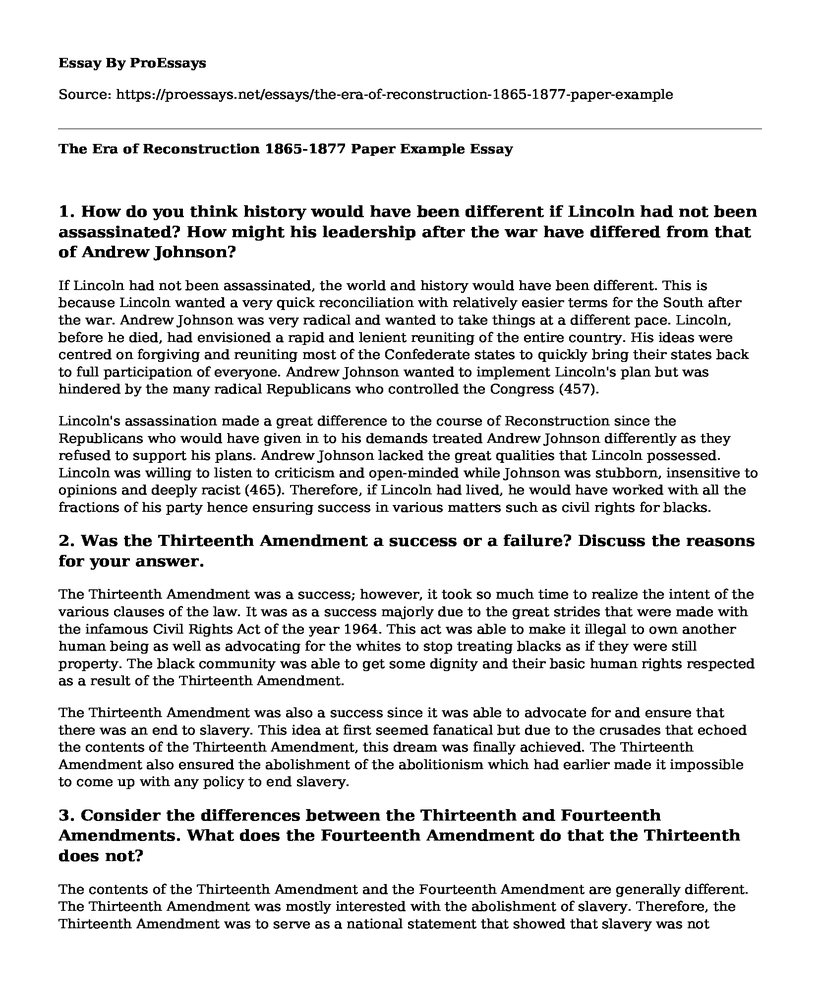1. How do you think history would have been different if Lincoln had not been assassinated? How might his leadership after the war have differed from that of Andrew Johnson?
If Lincoln had not been assassinated, the world and history would have been different. This is because Lincoln wanted a very quick reconciliation with relatively easier terms for the South after the war. Andrew Johnson was very radical and wanted to take things at a different pace. Lincoln, before he died, had envisioned a rapid and lenient reuniting of the entire country. His ideas were centred on forgiving and reuniting most of the Confederate states to quickly bring their states back to full participation of everyone. Andrew Johnson wanted to implement Lincoln's plan but was hindered by the many radical Republicans who controlled the Congress (457).
Lincoln's assassination made a great difference to the course of Reconstruction since the Republicans who would have given in to his demands treated Andrew Johnson differently as they refused to support his plans. Andrew Johnson lacked the great qualities that Lincoln possessed. Lincoln was willing to listen to criticism and open-minded while Johnson was stubborn, insensitive to opinions and deeply racist (465). Therefore, if Lincoln had lived, he would have worked with all the fractions of his party hence ensuring success in various matters such as civil rights for blacks.
2. Was the Thirteenth Amendment a success or a failure? Discuss the reasons for your answer.
The Thirteenth Amendment was a success; however, it took so much time to realize the intent of the various clauses of the law. It was as a success majorly due to the great strides that were made with the infamous Civil Rights Act of the year 1964. This act was able to make it illegal to own another human being as well as advocating for the whites to stop treating blacks as if they were still property. The black community was able to get some dignity and their basic human rights respected as a result of the Thirteenth Amendment.
The Thirteenth Amendment was also a success since it was able to advocate for and ensure that there was an end to slavery. This idea at first seemed fanatical but due to the crusades that echoed the contents of the Thirteenth Amendment, this dream was finally achieved. The Thirteenth Amendment also ensured the abolishment of the abolitionism which had earlier made it impossible to come up with any policy to end slavery.
3. Consider the differences between the Thirteenth and Fourteenth Amendments. What does the Fourteenth Amendment do that the Thirteenth does not?
The contents of the Thirteenth Amendment and the Fourteenth Amendment are generally different. The Thirteenth Amendment was mostly interested with the abolishment of slavery. Therefore, the Thirteenth Amendment was to serve as a national statement that showed that slavery was not allowed within the US. The Fourteenth Amendment dealt with the provision of citizenship to all people who were born or naturalized in the United States (461).
4. Consider the problem of terrorism during Radical Reconstruction. If you had been an adviser to President Grant, how would you propose to deal with the problem?
The problem of terrorism during Radical Reconstruction was fuelled by the Congressional elections of 1866. Most of the violence was carried out by the participants of the Ku Klux Klan (KKK), which was a very secretive terrorist organization which was closely allied with the ideologies of the southern Democratic radicals (475). If I had been an adviser to President Grant, I would propose to him that he deals with the problem in a peaceful way through dialogue and reconciliation. This is because if the members of the KKK were given an avenue to air their grievances, then both sides would come to an agreement hence reducing the terror activities.
References
Sweethaven, (n.d). Openstax Collage. U.S History. Available online at: http://www.sweethaven02.com/openstax/USHistory-LR.pdf/ Retrieved 29/01/2019
Cite this page
The Era of Reconstruction 1865-1877 Paper Example. (2022, Nov 07). Retrieved from https://proessays.net/essays/the-era-of-reconstruction-1865-1877-paper-example
If you are the original author of this essay and no longer wish to have it published on the ProEssays website, please click below to request its removal:
- September 11's Impact on American Journalism
- The Media Influences on the Criminal Justice System Essay
- Is Amnesty the Cause or Cure for Illegal Immigration? - Research Paper
- Essay Sample on Sneak and Peak Warrant: Combatting Terrorism & Crime
- Essay Sample on 2008 War Between Georgia & Russia: The Five-Day Battle
- Prison Population: A Cross-Section of Education Levels - Essay Sample
- Free Essay Sample on Mental Illness in Prisons







